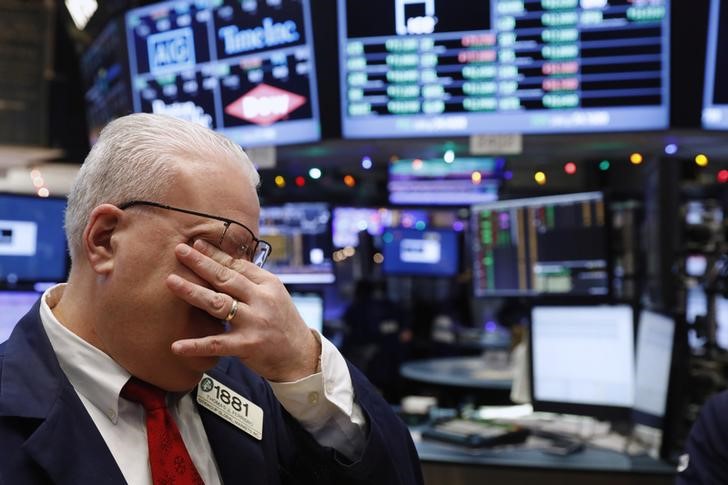 © Reuters.
© Reuters.
By Yasin Ebrahim
Investing.com – The Dow slumped Friday, closing out a brutal month for stocks as wave of big tech earnings this week failed to coax the bulls out of hiding.
The Dow Jones Industrial Average slipped 2.8%, or 939 points, the S&P 500 fell 3.5%, and the Nasdaq slumped 4%. The Nasdaq posted its worst monthly loss since 2008.
Amazon (NASDAQ:AMZN) fell more than 14%, suffering its biggest one-day loss since 2006, after the e-commerce giant reported softer second-quarter guidance following an unexpected quarterly loss as the value of its stake in Rivian hurt results. Rivian, the electric vehicle maker, is down nearly 80% since going public last year.
“[A] weaker-than-expected 2Q revenue guide is taking a bite of the bull thesis [for Amazon] that is predicated on accelerating revenue and OI (operating income) growth as we move through 2022,” Deutsche Bank said in a note as it cut its price target on the stock to $3,500 from $4,100.
Apple (NASDAQ:AAPL), meanwhile, handily beat fiscal second-quarter estimates, but missed on guidance and flagged the impact of the demand and supply chain troubles in China. The stock fell more than 3%.
The tech giant delivered a record quarter of services revenue amid growing install base, but “increasing macro uncertainty and inflationary pressures will likely result in lower product demand during 2022,” Credit Suisse said after lifting its price target on the stock to $169 from $168.
The slew of tech earnings seen this week from megacap tech including Alphabet (NASDAQ:GOOGL), Meta Platforms (NASDAQ:FB), Microsoft Corporation (NASDAQ:MSFT), Apple and Amazon, which collectively make up more than a quarter of the S&P 500 weighting, was seen by many as a pivotal week that could either add to the negative sentiment on the broader market, or provide much needed stability.
The added pressure from a rising interest environment, which hurts sentiment on growth, could force investors to rethink how much of a role big tech will play in their portfolios.
“[T]hese are the stocks that have propelled the market for years and now we're going to have to get back to more of an equilibrium,” Eric Diton, president and CEO of The Wealth Alliance, told Investing.com in an interview on Friday. “These stocks, as we've said for a long time, are just way over owned.”
Semiconductor stocks were also played role in the broader market selloff as Intel Corporation (NASDAQ:INTC) fell nearly 7% following weaker-than-expected second quarter guidance amid supply-chain bottlenecks and softer PC demand.
AbbVie (NYSE:ABBV), meanwhile, cut its full-year guidance after reporting mixed quarterly results as revenue fell short of estimates. Its shares fell more than 6%.
In other news, Tesla (NASDAQ:TSLA) closed in the red after chief executive Elon Musk said he wouldn’t be selling more shares to fund his $44 billion Twitter (NYSE:TWTR) take-private deal. The Tesla sold about $8.5 billion of Tesla after agreeing to buy Twitter.

